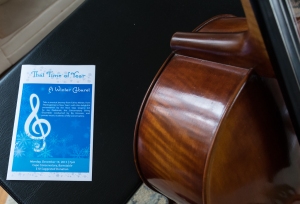String Ensemble is finished for the fall. Meetings were rather sporadic (our coach was away and then ill) and we never worked up a full program for a concert. The group was very small this fall, actually too small for two cellos and a bass (only three violins and 1 viola), so I’m going to drop out for the winter. Doesn’t make sense to have the director always saying to the cellos, please play more softly, you are too loud, when we are barely touching the strings!
We did do a partial program at the Christmas Concert at the conservatory, so at least we did work up a few pieces for performance, which was good.
The cello choir finally got organized toward the end of the fall session. Several people have dropped out already, so I’m not at all sure that it will continue. The selected pieces are way easy and I’ve been playing 4th cello; this is awful on my 7/8 cello, which has terrible wolfs on the C string where most of the playing happens for those parts. And the parts are so easy, that it’s hard to take them seriously and practice!!! So I guess I’m back to no ensemble playing for the foreseeable future!
I have started working again on the Bach Suites. I’m also back to working on some Popper etudes and want to go back and work again on pieces that I’ve learned previously. I’ve spent far too much of my time this fall on ensemble pieces that I’ve just not enjoyed.



